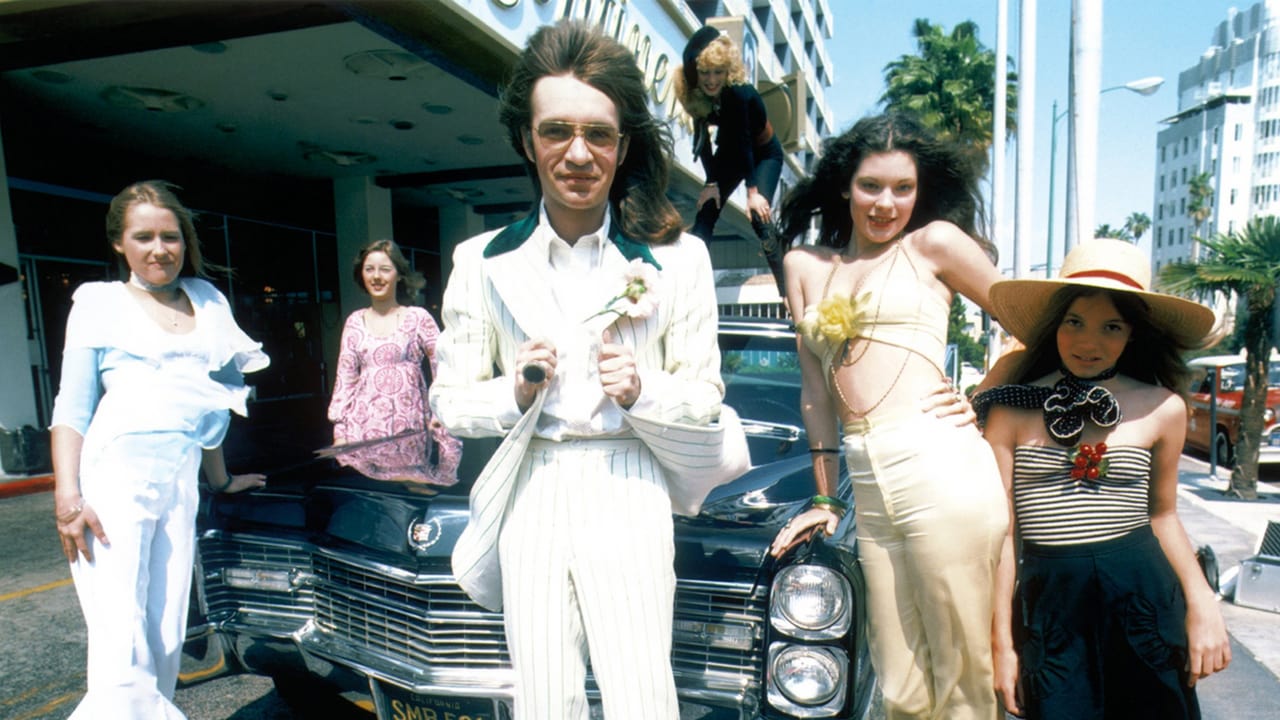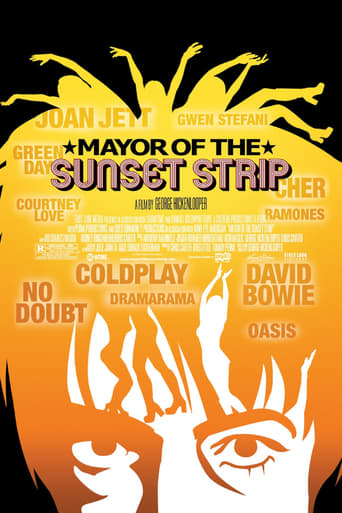convergentmedia
A few months ago, while awaiting my late-night food at *that* deli in Hollywood, I went up to a seated Rodney Bingenheimer and told him straight up: "'Mayor of the Sunset Strip' is one of the most important films I've ever seen." Emphasis on the word "important". I then explained why, and he just smiled, closed his eyes and nodded.Less an indulgence in the overplayed phenomenon of "celebrity", this film is much more of a (rare) viewing of notoriety's seedy, cultist aspects under modern capitalism. In an age when "fame" and "celebrity" are their own forms of hard currency (E.G. invite a known celebrity to YOUR party -- whatever the occasion -- and see how many people RSVP within a matter of hours...), this is a film worth studying. The Yale-educated director, who not ironically directed "Hearts of Darkness", shrewdly turns the subject of Rodney Bingenheimer's literal 'staying power' in Hollywood into an entertaining and thought-provoking look at FAME AS A DISEASE. When the film is viewed under this poignant and increasingly relevant context, then Rodney really isn't that different from anyone else in America (or hyper-consuming Western culture in general). Nope, no one ultimately cares that you ran into Paul McCartney once in your twenties, but you'll keep mentioning it anyway...because you *matter*!!!I watched the film on DVD (the preferred format, considering the variety of interviews in the "extras" portion) again after a yearlong lapse from my first viewing, only to further absorb its potency on the above-mentioned. A telling and strangely comforting aspect shown is the palpable discomfort on the faces of certain demonstrably lifelong insecure hyper-celebrities (Cher, Brooke Shields, Liam from Oasis) over talking about Rodney, their mercurial lives and ultimately, how they view "fame". One senses that, even if after attaining that much "acceptance", that you're still not comfortable in your own skin, then it's best not to carry as much celebrity currency in your pockets in the first place when - God Forbid -- you'd have to ever pay some of it back to those who've helped you attain it along the way.Not all of the film's included luminaries came across in such fashion, however -- Ray Manzerick, Gwen Stefani, Nancy Sinatra, Elvis Costello, Brian Wilson and David Bowie more or less stayed clear of such forced sincerity (read: barely contained cringing) in this film. And yet, I'd be lying if I said that all of the awkward celebrity posturing wasn't the most entertaining aspect of the film – yes, even more so then simply the presence of the celebs who appear.Brooke Shield's interview in the DVD is akin to an actual cognitive behavioral therapy session, where she relates how she's (supposedly) overcome her past nagging needs for acceptance. This caveat is telling, considering her much publicized postpartum depression (E.G. newborns don't know how to adore "celebrity" on cue, hence potentially magnifying the neuroses of past rejections felt by such otherwise "me-first" celebrities during, say, all-night baby crying sessions).Author and 'fame expert' Leo Braudy is featured briefly commenting on the nature of fame and the public's obsession with it, concluding that he doesn't know who Rodney Bingenheimer is. I would've rather included authors Richard Schickel or Tyler Cowen (the latter an economist), who would've provided better insights without the added flippancy. Ironically (or maybe not so, considering the difference between having BEEN in the fame trenches versus simply writing about them), Rodney's darker trenches mate and alter-ego Kim Fowley actually sums up fame better than does Braudy with a nutshell synopsis of what drives people to seek fame, or the famous. Fowley accurately diagnoses Rodney and everyone else in Hollywood -- in itself worth watching the movie for, especially because Fowley illustrates the wacky, surreal and even palpably evil accumulation of frothy on-the-edges-of-fame excess that isn't limited to just the non-Wilshire Blvd. (read: corporate) entertainment industry, but sums up fame's very heart and that industry's core.The film also shrewdly (and deservedly) shines a subtly dismissive light onto "alternative radio" juggernaut, KROQ, which is now to 'cutting edge' and 'fidelity to founding visionaries' what Alice Cooper was to 'subtlety'. KROQ DJ Jed the Fish's summing up of KROQ's essential value of Rodney Bingenheimer as more or less irrelevant to modern musical trends is tactically contrasted by the director with a brief yet accurate portrayal of KROQ's core current audience -- sweaty, tattooed, violent, soul-less subhuman Huns who urinate openly at concerts and grunt to hackneyed noise passing as their distressingly elected life anthems.The viewer stumbles upon something: Being that "fame" has created its own marketplace, it's obvious that Rodney has a unique talent that can be shopped around (to Indy 103.1 or satellite radio, for instance)...away from a midnight to 3:00 AM slot on KROQ. Yet, because of the uniquely demonic characteristics of cut-throat, increasingly commercial yet still elusive Hollywood, one then realizes possibly why the less opportunistic 'good souls' (to quote Starsailor) like Rodney don't have agents shopping their said talents around: Despite not retaining any known instrumental or singing talents, a "radio-friendly voice" (Jed the Fish? Swedish Eagle? Adam Corolla?!?) or Teutonic good looks, still, at least Rodney is not a hack.I'd make this film required viewing in suburban high schools as well as in college courses involving media or cultural studies, sociology, psychology, the arts and/or the humanities. Best to cork that genie in our tortured youth before 'groupie-dom' tries to compensate for their disturbingly growing lack of self-esteem...With that said, God Bless Rodney Bingenheimer.
ronaldwvaughan
As a co-star in this movie I am duty-bound to make a correction, namely, that RODNEY was NOT dropped off at Connie Stevens' house by his mother. This was a fabrication introduced by the director, and voiced by Kim Fowley.I agree with several people: the movie should be re-cut (it's possible, because the raw footage is still in storage) and the crap (the too- "dark" stuff) removed...and made much longer. So much was never seen...and this was supposed to be a pro-RODNEY movie (and not an anti-Kim Fowley picture). It could have been a GREAT documentary instead of just a GOOD one...Trivia: Originally, this movie was supposed to have been offered via Paramount Pictures. What would have happened IF it had, one wonders?
noir guy
According to this film, the 'Mayor of the Sunset Strip' is Rodney Bingenheimer. Rodney who? Well, watch this fascinating documentary, directed by George Hickenlopper (HEARTS OF DARKNESS : A FILMMAKER'S APOCALYPSE), and find out! Bingenheimer is seemingly the kind of selfless guy who appears to have initially been a kind of male groupie in the 60s and who subsequently unconditionally promoted U.S. and U.K. rock and pop acts through his L.A. based 'Rodney on the Roq' radio show and is acclaimed in almost reverential tones by those who owe their Stateside break to the airplay which apparently broke them through to the U.S. mainstream. As these artists include the likes of Brian Wilson, The Ramones, The Sex Pistols, Oasis and Coldplay (not sure I can forgive Rodney those last two), and given that the soundtrack includes these bands and many more individuals and groups (e.g. including a certain Mr. Bowie) which would have set virtually any other movie back several million greenbacks had they not offered their tracks for the minimum cost required to sort the legal paperwork, one can see how revered this apparently somewhat impoverished starmaker is (although his collection of pop memorabilia could set him up for several lifetimes should he choose to part with it). A Zelig-like figure whom the film's archival footage (filmed and photographic) shows to have been present at virtually all the epochal rock moments of the last 40 years, as well as one whose life has perhaps not turned out to be as successful as one might expect (the man still appears to dine at Denny's, for crying out loud!) and who seems to have been let down by those who might have reciprocated more kindly for the leg-up he appears to have given them, is well-served by this compassionate, occasionally hilarious (the Cherie Currie story about sinister svengali producer/performer Kim Fowley and his punchy riposte is a hoot) and ultimately rather sad and cautionary tale of the darker side of the American Dream. A man who, as my friend pointed out afterwards, appears to have inspired The Ramones' choice of tonsorial grooming and who still appears to be occasionally mistaken for The Monkees' Davy Jones (he originally auditioned for Jones' role and was sometimes deployed as his double which, if nothing else, seems to have added a few notches to his bedpost) and whose sad-faced countenance speaks more vividly of a lifetime of let-downs than any rancid verbal outpourings (he actually seems too polite to engage in on-screen badmouthing of even those who might deserve a well-aimed verbal broadside), this features an engaging mixture of talking head and rare archival footage and entertains as it delivers an impressionistic vulture's eye view of the West Coast zeitgeist, leaving one in no doubt that the film's title appropriately rests on this unlikely, slightly-built and spindly-legged character. An enlightening documentary, and highly recommended fare with no 'dead air'.

